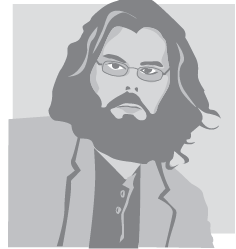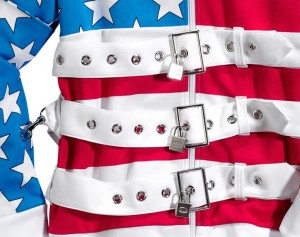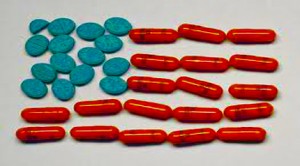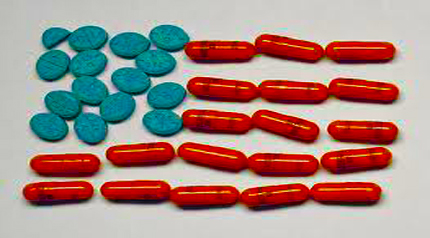 aNewDomain — Another young white man went into some place armed to the teeth and shot a bunch of people, and then shot himself, or got the cops to do it.
aNewDomain — Another young white man went into some place armed to the teeth and shot a bunch of people, and then shot himself, or got the cops to do it.
The story is always relevant because this is America. How many mass shootings a year? So many we don’t even really know. Those are the basic elements of the story. Sometimes the guy is a little older. Rarely, he isn’t white. One or two of them survive into custody. What else do they have in common?
Guns.
Okay, everyone who murders people with a gun has a gun. In this case, it doesn’t seem that unreasonable to conflate correlation with causation. No guns, no mass shootings.
There are ways to argue this one away but I don’t really want to. The apathy we have around guns, this is the apathy felt by every mass shooter. There’s nothing we can do. We can’t beat the gun lobby. Our freedom is at stake here. This is a slippery slope to vulnerability. This is how the Nazis got started.

Our apathy creeps really quickly into rage, doesn’t it? From “we can’t get action on this” to “Obama is coming for my guns.”
The truth is probably that making most kinds of guns illegal won’t have a huge impact on the phenomenon. Other countries have mass stabbings and mass hatchet attacks and, while the body count is lower, and that’s desirable, you haven’t gotten to the bottom of the problem.
Regulating guns has a way of producing a nasty black market for them. And people who want them now have untraceable ones. The same problems apply to regulating more or less anything people really want. Abortions? Make them illegal, and now you have people performing the service in unregulated environments – dirty, unhygienic, dangerous. Drugs? A large, unregulated drug market is at least as problematic as the large, regulated drug market we already have, wouldn’t you say?
So, some shooters got their guns legally and some illegally. Will more regulation on guns help us? Background checks won’t catch these various first-time offenders, and mental health screenings will violate our civil rights – since the second amendment was reinterpreted to guarantee the individual right to have firepower, taking away that right based on a medical issue becomes very problematic. And speaking of that …
Mental Illness.
Is it crazy to shoot up a school, or a restaurant, or a post office? Do only the insane go postal?
Certainly James Holmes has some serious mental health problems. But what about Dylann Roof, the man who shot up a black Charleston church famous mostly for its connections to the civil rights movement? Is it insane to hate people, and to hate them so badly you want to kill them? Is it insane to hate Christians, as Christopher Harper-Mercer evidently did, enough to shoot them in their place of study?
There’s trouble here. These acts are sick. Undeniably the product of troubled minds. But does this constitute mental illness?
See, there’s really no such thing as mental illness, or objectively speaking, as evil. We revile these actions and cannot imagine how a sane, healthy, good person could enact them. But mental illness, like evil, is just a category. If you meet particular criteria of observable behavior, you can be classified as having one or more mental illnesses. But these are only categories, a map of no territory. Thoughts themselves cannot be ill: only deviant, abnormal, undesirable … and these are all judgements, just like evil. Sometimes we can agree pretty universally – like a mass shooting. Sometimes we cannot – like hearing voices, talking to spirits, having an imaginary pet cat. But in all cases, what we have is a construct.
And the construct of mental illness does not begin to cover this phenomenon. When the Dylann Roof murders happened, I wrote extensively about who was to blame for that: all of us. Is it insane for Dylann Roof to hate black people when that is what prevailing culture has told him to do, demanded that he do for his whole life? When he lives in a place full of Confederate battle flags and streets named after people who fought to keep black people as slaves, where he drives across a bridge where black people were beaten, some to death, for the crime of demanding to be registered to vote?
Some of the people who murder with guns have been diagnosed with mental illnesses. Many more were not. And almost nobody with a “mental illness” murders anyone else. Looking at the prison population, we find it is extraordinarily difficult to be found not guilty by reason of insanity (NGRI). So why are we so willing to let people off the hook for mass shootings with the claim of madness?
 Some of the people who shoot people were diagnosed with depression. They took medication that for depression. Leading us to the next possible assertion:
Some of the people who shoot people were diagnosed with depression. They took medication that for depression. Leading us to the next possible assertion:
Drugs.
It seems like a lot of our mass shooters are taking or have taken some kind of psychotropic medication. And, again, it’s easy to conflate correlation and causation. Do antipsychotics and antidepressants cause killing sprees?
It’s too easy to make this one go away. Look: psychotropic medications are the most profitable part of the pharmaceutical market. Get someone on psych meds and you have a customer for life. Because psych meds do not cure illnesses; they suppress symptoms (at best) and those symptoms will always need suppression.
Furthermore, modern meta-analysis shows that drugs aren’t really that great at treating any kind of mental illness. Results showing large effect sizes have been cherry-picked for years, a corrupt system of drug approval in a for-profit market of psychopaths who will do anything for money. For an in-depth investigation into the problem of money in medicine and particularly in psychiatric medicine, I suggest reading Drugging our Children (Olfman and Robbins, 2012).
When we find drugs liable for suicide and homicide, we’re probably ignoring some more basic facts. Such as the fact that drugs are just not effective at treating the problem of interest. Depression does not, by and large, remit to chemical interventions because it is not a chemical problem, and we have ignored the person. Reduced her to her neurons and neurotransmitters, made her believe it is wrong or inadequate or sick to feel sad in the face of life’s various problems – racism, sexism, heterosexism, nearly constant violence, rape, victim blaming, xenophobia … unemployment driven by psychopathic business practices but blamed on us, the workers.
 Why wouldn’t someone medicated for depression, their problems pushed aside as unimportant, resort to more desperate acts?
Why wouldn’t someone medicated for depression, their problems pushed aside as unimportant, resort to more desperate acts?
Media.
Violent video games, Walking Dead shows, ultra-violent movies and music. Fuck Tha Police, Killing in the Name. Body Count.
But look. Violent media have always been a fact of life, it’s just that the media in question haven’t always been fiction. The news has forever been full of stories of atrocities. The colonization of Africa, the stories sent back by Livingstone. The Hindenburg disaster. The World Wars and Vietnam. Violence has always come to us across the airways, from the radio in the living room to the TV to the world news shown in theaters. Bugs Bunny was some of the most violent, racist stuff you can imagine, and Tom and Jerry sometimes worse, but everyone saw these features before their gangster movies full of car chases, shootouts and racist characterizations.
So what? What is to blame for this phenomenon?
What Do All These Things Have in Common?
That’s the question.
What makes people want to have guns in the first place? If you live a good life, you have no fear of dying, no unfinished business. Your choices mattered, you learned from your hardships, you overcame the odds. And when the time comes to die, you are happy enough to go. When people grasp for life, demand more life even at the expense of the lives of others, is there something psychological at play?
Something psychological that is not ill, but well?
Krishnamurti said, it is no measure of health to be well adjusted to a profoundly sick society. The individual is not mentally ill. They are adjusted to sickness. They have been told that their worries are just whining. That the solution to the terror of death is to be found in churches or the politics of ideology. That the most important things happening in the world, shown on the news, are violence and sadness and a bit with a dog.
Why can’t we get gun regulation? Because we don’t want it.
We don’t want it because we’re afraid to die by random violence. In a school shooting or in a mugging or a carjacking.
Because we’ve been turned against one another, white and black people, white and brown people, Christians and Muslims and Jews, scientists and the religious, rich and poor. Meanwhile a few people have walked off with our freedom. Politics is impenetrable and we vote for Donald Trump in despair.
That’s the common element, of course: despair.
You want guns because you despair of dying in some meaningless fashion, as though there were any other way to die. You take your Paxil or your Celexa or your Prozac because of despair that your doctor thinks is sickness but that is really just awakeness, awakeness to the fact that we are coming to the end of things and you are actually quite small and ineffectual and powerless. You listen to music that expresses your most painful feelings, gives them an outlet, and the news reports that Rage Against the Machine caused the despair, caused the violence, rather than merely expressing what you felt already.
Despair is the problem, a widespread social despair, and it was caused by … well, by us.
Because we didn’t want to face up to how we came to be here. Through slavery and genocide. We want to celebrate the myth that Columbus was an Italian hero rather than a mass murderer. We want to celebrate the American ethos of equal opportunity and to do that, we have to blame poor black people for being unemployed, blame minorities for being majority in the prison system, blame women for being raped. We have to turn too many blind eyes to too many problems.
The despairing mind says fuck it, why not? Where has love ever gotten you? Why not shoot up a school? Why not shoot up a church? Bomb a Federal building? Blow up a marathon? We work hard and play by the rules and what has it ever gotten us? So fuck it, why not let the rage out, why not rampage?
You want fewer mass shootings? Yeah, me too. And we can stop it. We can.
You know what we have to do? We have to acknowledge that people who are despairing right now, they’re the sane ones, the normal ones. It makes sense to despair when you’re looked down on, tormented, bullied. When you feel different and you’re alienated. When your culture is alienated. When violence is glorified not by movies and games and television, but by the government, by the news. When violence is fetishized by political parties.
It’s an us versus them world. Even our Liberal heroes, like Bill Maher, teach us the solution is to hate Muslims and conservatives. And for some people there just is no us, no us at all. When nothing can express the deep, abiding hopelessness we feel, sometimes people lash out like animals.
You want to hate Dylann Roof, but the guy is really just a dog by the side of the road, not deserving of hate any more than you are. He’s a dog that’s been hit by a car and he’s full of rage and pain. When someone comes by he doesn’t know if they plan to help him, he doesn’t know what help is. He only knows he’s full of pain and maybe you’re the cause of it – so he bites. He bites himself, a poor, wounded animal, and he bites you, too, and suddenly he seems to deserve all that has happened to him.
It is hardest to have compassion for the people who have hurt us. These people, these shooters, they hurt us and that’s the point – they want us to feel what they feel. And we do.
We feel such despair, such loss. Helplessness and hopelessness. Confusion, yeah, that too. These are what the shooter feels. Maybe even gratification: I couldn’t get anything else right, but I can do this, I can claim this power – and aren’t you gratified that you heard of them first, that you know all their names, that you have someone you can point at and blame for your troubles?
Mental health screenings won’t save us from this, because these are not ill people. They’re hopeless people. Despairing ones. Drugs won’t save us, and gun control won’t save us, and banning rap music won’t save us.
What will save us is learning, and we’re almost out of time. Learning that guns don’t solve problems any more than gun control does. When we decide to outlaw all the guns, that’s when we’ll be saved – not because we wrote a law, but because we wanted to. Do you understand? Because we decided that the violence was no longer acceptable. Because we decided to reach out to the disaffected, to try to love them well rather than medicate them into conformity. Because we decided to listen to the music, to what it is expressing even now. Pain and rage. Despair.
For aNewDomain, I’m Jason Dias.
Cover image: Tumblr.com, All Rights Reserved; image one: AmericanGunCase.com, All Rights Reserved; image two: MenAndSkin.wordpress.com, All Rights Reserved; image three: addictionsearch.com, All Rights Reserved.













